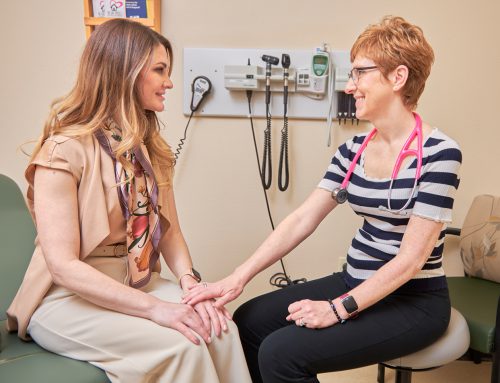Are You Experiencing Appendicitis Or A Ruptured Ovarian Cyst?
Published September 22, 2023

Dealing with pain is never fun, especially if it comes on suddenly and continues to intensify. It can be scary and confusing, too.
Appendicitis, or an inflammation of the appendix, can sometimes be the cause of this rapid onset of pain, starting near the navel and moving to the lower right of the abdomen where it can become excruciating, unlike any pain you have ever felt.
Other symptoms of appendicitis include:
- Loss of appetite
- Nausea or vomiting
- Fever
- Swelling in the abdomen
- In some cases, bowel problems like constipation or diarrhea
Don’t wait to call 911. If left untreated, an inflamed appendix could rupture, which is a serious and potentially life-threatening condition. The sooner you get to the hospital, the better.
Ovarian cysts
Women can experience ovarian cysts, which are fluid sacs in the ovary that appear during ovulation. There are several kinds of ovarian cysts, but most are naturally occurring during the menstrual cycle and are usually benign.
The American College of Obstetricians and Gynecologists lists the following types of ovarian cysts:
- Functional cyst: The most common type, usually with no symptoms, but are the most common to rupture.
- Teratoma: A benign tumor that can become cancerous.
- Cystadenoma: A benign tumor that can grow quite large.
- Endometrioma: Resulting from the condition endometriosis.
If an ovarian cyst ruptures, it can cause intense pain that may feel similar to an appendicitis. There are some differences, however. A ruptured ovarian cyst could produce pain throughout the whole abdomen area, not only the right side. The pain, at first, may be dull and come and go, but once it ruptures, the resulting pain is sharp. It can be accompanied by nausea and vomiting, faintness or dizziness, back pain, rapid breathing, even fever.
Abdominal pain can be related to a variety of health conditions. Anyone experiencing sharp abdominal pain should call 911 and seek emergency help.
At Coquille Valley Hospital, not only are our emergency care providers available 24/7, 365 days a year should you experience a ruptured cyst or appendix emergency, but our medical imaging department has Computed Tomography (CT) and Magnetic Resonance Imaging (MRI) available to help your primary care provider diagnose and track ovarian cysts.
Subscribe to our monthly emails for Your Well-Being! Get health and wellness tips, hospital news, staff spotlights, career opportunities, our cafe menu and more, sent right to your inbox!
DISCLAIMER: No content on this website, regardless of date, should be used as a substitute for direct medical advice from your primary care provider.




